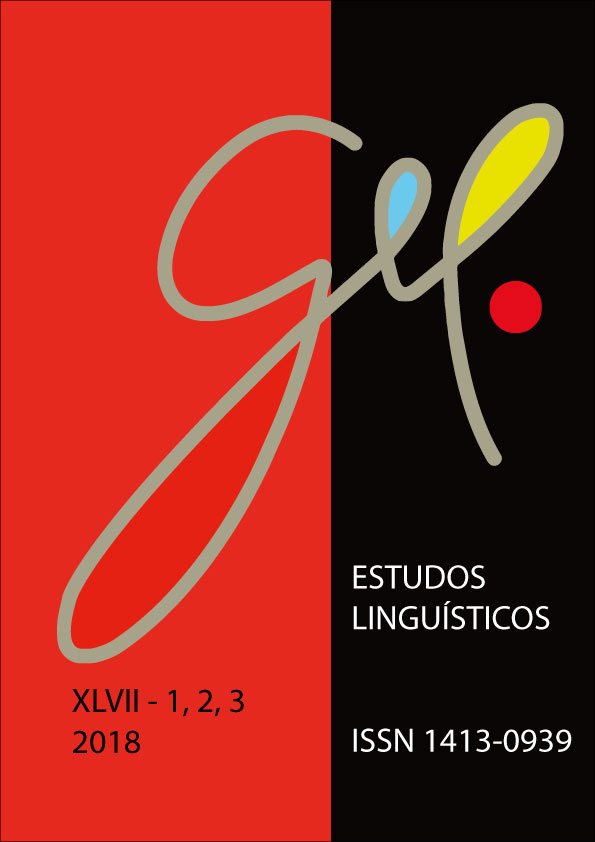Do “léxico gay” à Linguística Queer: desestabilizando a norma homossexual oculta nas Teorias Queer
DOI:
https://doi.org/10.21165/el.v47i3.2049Palavras-chave:
Linguística Queer, norma homossexual oculta, performatividadeResumo
O presente artigo examina se, apesar de permitir maiores desconstruções e desnaturalizações das categorias de sexualidade que usamos hoje em dia, a Linguística Queer sofre de um dos problemas que afeta os Estudos Queer em geral: uma “norma homossexual oculta” (GUSTAVSON, 2009), ou priorização do estudo de homens gays. Embora a Linguística Queer tenha prestado maior atenção às performances discursivas de lésbicas, ainda há uma lacuna de pesquisas sobre performances de outras “orientações” sexuais e performances discursivas relacionadas a práticas sexuais que desestabilizam o binário heterossexual/homossexual. Portanto, pretende-se discutir alguns exemplos de estudos recentes realizados no campo da Linguística Queer que vão além da “norma oculta homossexual”: um sobre performances de mulheres bissexuais e outro sobre performances de adeptos/as da prática de pegging.
Downloads
Referências
AUSTIN, J. L. Quando dizer é fazer: palavras e ação. Tradução de Danilo Marcondes. Porto Alegre: Artes Médicas, 1990 [1962].
BARRETT, R. Is queer theory important for sociolinguistic theory? In: CAMPBELL-KIBLER, K. et al. (Org.). Language and Sexuality: Contesting meaning in theory and practice. Stanford: CSLI Press, 2002. p. 25-43.
BASTOS, L. C.; BIAR, L. de A. Análise de narrativa e práticas de entendimento da vida social. D.E.L.T.A, São Paulo, v. 31-especial, p. 97-126, 2015.
BORBA, R. Linguística queer: uma perspectiva pós-identitária para os estudos da linguagem. Revista Entrelinhas, São Leopoldo, v. 9, n. 1, p. 91-107, jan./jun. 2015.
BUCHOLTZ, M.; HALL, K. Theorizing identity in language and sexuality research. Language in Society, v. 33, p. 469-515, 2004.
BUTLER, J. Excitable Speech: A Politics of the Performative. Nova Iorque e Londres: Routledge, 1997.
BUTLER, J. Problemas de gênero: Feminismo e subversão da identidade. Tradução de R. Aguiar. Rio de Janeiro: Civilização Brasileira, 2003 [1990].
CAMPBELL-KIBLER, K.; PODESVA, R. J.; ROBERTS, S. J.; WONG, A. (Orgs.). Language and Sexuality: Contesting Meaning in Theory and Practice. Stanford: CSLI Publications, 2002.
CHESEBRO, J. W. Gayspeak: Gay Male and Lesbian Communication. Nova Iorque: Pilgrim Press, 1981.
CONNELL, R. Gênero em termos reais. Tradução de M. Moschkovich. São Paulo: nVersos, 2016.
CORY, D. W.; LEROY, J. P. A Lexicon of Homosexual Slang. In: CORY, D. W.; LEROY, J. P. The Homosexual and His Society: A View from Within. Nova Iorque: Citadel Press, 1963.
DE LAURETIS, T. Queer Theory: Lesbian and Gay Sexualities. Differences: A Journal of Feminist Cultural Studies, v. 3, n. 2, p. iii-xviii, 1991.
ERICKSON-SCHROTH, L.; MITCHELL, J. Queering Queer Theory, or Why Bisexuality Matters. Journal of Bisexuality, v. 9, n. 3-4, p. 297-315, 2009.
FARRELL, R. A. The Argot of the Homosexual Subculture. Anthropological Linguistics, v. 14, p. 97-109, 1972.
GRICE, P. Lógica e conversação. Tradução de J. W. Geraldi. In: DASCAL, M. (Org.). Fundamentos metodológicos da linguística: Pragmática, v. 4. Campinas: UNICAMP, 1982. p. 81-103.
GUSTAVSON, M. Bisexuals in Relationships: Uncoupling Intimacy from Gender Ontology. Journal of Bisexuality, v. 9, n. 3-4, p. 407-429, 2009.
KIMMEL, M. S. Masculinity as Homophobia. p. 147-151, 2004. Disponível em: <http://eurogender.eige.europa.eu/sites/default/files/Masculinity.pdf>. Acesso em: 24 jul. 14.
LEAP, W.; BOELLSTORFF, T. (Orgs.). Speaking in Queer Tongues: Globalization and Gay Language. Urbana e Chicago: University of Illinois Press, 2004.
LEWIS, E. S. “Acho que isso foi bastante macho pra ela”: Reforço e subversão de ideologias heteronormativas em performances narrativas digitais de praticantes de “pegging’’. 2016. 333 f. Tese (Doutorado em Estudos da Linguagem) – Faculdade de Letras, Pontifícia Universidade Católica, Rio de Janeiro, 2016.
LEWIS, E. S. “Não é uma fase”: Construções identitárias em narrativas de ativistas LGBT que se identificam como bissexuais. 2012. 267 f. Dissertação (Mestrado em Letras/Estudos da Linguagem) – Faculdade de Letras, Pontifícia Universidade Católica, Rio de Janeiro, 2012.
LEWIS, E. S. Teoria(s) Queer e performatividade: mudança social na matriz heteronormativa. In: MACEDO, E.; RANNIERY, T. (Orgs.). Currículo, sexualidade e ação docente. Petrópolis: DP et Alii, 2017. p. 157-186.
LIVIA, A.; HALL, K. (Orgs.). Queerly Phrased: Language, Gender and Sexuality. Oxford e Nova Iorque: Oxford University Press, 1997.
LOURO, G. L. Um corpo estranho: ensaios sobre sexualidade e teoria queer. Belo Horizonte: Autêntica, 2004.
LUMBY, M. Code Switching and Sexual Orientation: A Test of Bernstein’s Sociolinguistic Theory. Journal of Homosexuality, v. 1, n. 4, p. 383-399, verão, 1976.
LURIE, S. Performativity in disguise: ideology and the denaturalization of identity in theory and The Crying Game. The Velvet Light Trap, v. 43, p. 51-62, primavera, 1999.
MOONWOMON, B. Toward a Study of Lesbian Speech. In: BREMNER, S. et al. (Orgs.). Proceedings of the First Berkeley Women and Language Conference. Berkeley, California: Berkeley Women and Language Group, 1985. p. 96-107.
MOTSCHENBACHER, H. Taking queer linguistics further: sociolinguistics and critical heteronormativity research. International Journal of the Sociology of Language, v. 212, p. 149-179, 2011.
MURRAY, D. A. B. Takatapui, Gay or Just Ho-mo-sexual, Darling? Maori Language, Sexual Terminology, and Identity in Aotearoa/New Zealand. In: LEAP, W.; BOELLSTORFF, T. (Orgs.). Speaking in Queer Tongues: Globalization and Gay Language. Urbana e Chicago: University of Illinois Press, 2004. p. 163-180.
MURRAY, S. O. The Art of Gay Insulting. Anthropological Linguistics, v. 21, p. 211-223, 1979.
QUEEN, R. A Matter of Interpretation: The ‘Future’ of ‘Queer Linguistics’. In: CAMPBELL-KIBLER, K. et al. (Orgs.). Language and Sexuality: Contesting Meaning in Theory and Practice. Stanford: CSLI Publications, 2002. p. 69-86.
RODGERS, B. The Queens’ Vernacular: A Gay Lexicon. São Francisco: Straight Arrow Books, 1972.
SEDGWICK, E. Epistemology of the Closet. Berkeley e Los Angeles: University of California Press, 1990.
STRAIT AND ASSOCIATES. The Lavender Lexicon: Dictionary of Gay Words and Phrases. San Francisco: Strait, 1964.
SULLIVAN, N. A Critical Introduction to Queer Theory. Nova Iorque: New York University Press, 2003.
WEBBINK, P. Nonverbal Behavior and Lesbian/Gay Orientation. In: MAYO, C.; HENLEY, N. (Orgs.). Gender and Non-verbal Behavior. Nova Iorque: Springer, 1981. p. 253-259.
WILCHINS, R. Queer Theory, Gender Theory: An Instant Primer. Los Angeles: Alysin Books, 2004.



